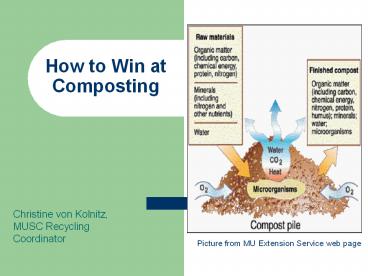How to Win at Composting PowerPoint PPT Presentation
1 / 15
Title: How to Win at Composting
1
How to Win at Composting
- Christine von Kolnitz, MUSC Recycling
Coordinator
Picture from MU Extension Service web page
2
How to Win at Composting
- Educate Yourself and Practice Compost at Home
- Choose Team Members
- Develop the Game Plan
- Know the Rules
- Show Me the Money
- Collection Strategies
- Track your Stats
- Cheering Section
3
Educate yourself and practice compost at home
- The best advice I could give anyone is to make
sure you have practical experience. Do try this
at home! - http//www.musc.edu/recycle/vermicompost.htm
- http//www.mastercomposter.com/
- http//www.compostingcouncil.org/index.cfm
- http//cityfarmer.org/wormcomp61.html
- http//www.vermico.com/
- http//www.vermitechsystems.com/home.html
- http//www.fac.unc.edu/WasteReduction/Recyclables/
animal_bedding.asp
4
Educate yourself and practice compost at home
- http//www.uvm.edu/uvmppd/Services/Recycling_and_
Solid_Waste/?PageComposting/Composting.html - http//www.ruf.rice.edu/envintrn/report99/ruepr99
.html - http//www.ithaca.edu/remp/composting.htm
- http//darkwing.uoregon.edu/recycle/Composting.ht
m - http//compost.css.cornell.edu/Composting_homepage
.html - http//www.epa.gov/msw/compost.htm
- http//www.earth911.org/master.asp?slibaorganic
s/organics.asp - http//www.composters.com/main.shtml
5
Know the Rules
- Check with your Safety Department to determine if
there are any regulations that govern composting
in your State - Municipal Solid Waste by Statehttp//www.epa.gov/
epaoswer/non-hw/muncpl/states.htm - Raymond Communications Recycling Laws Update
http//www.raymond.com/ - US EPA Laws and Regulationshttp//www.epa.gov/epa
home/lawreg.htm
6
Know the Rules
- Create Guidelines for working with the compost
for your employees - Working with the Wormshttp//www.musc.edu/recycle
/vermicompost.htm
7
Choose Team Members
- Top-level commitment and leadership are critical
to adopt and implement a composting program - Crucial team members include maintenance,
grounds, and cafeteria staff - You may want to include housekeeping and research
staff - Other possible team members include infection
control and nursing staff
8
Develop the Game Plan
- Use established performance improvement or
quality methodologies. Heres one example - FOCUS-PDCA
- F Find a process
- O Organize a team
- C Clarify existing knowledge
- U Understand process variation
- S Select the improvement
- P Plan the improvement
- D Do the improvement
- C Check
- A Act
- http//www.musc.edu/qn/QualityNetwork.html
9
Develop the Game Plan
- Determine what and how much you have to compost
- Yardwaste
- Food waste (pre and post consumer)
- Animal Lab Waste (non-hazardous, herbivorous)
- Paper Products (cardboard, newspaper, hand
towels) - Investigate on-site and off-site composting
choices - For example our bulky yardwaste is composted by a
local municipality. We use 4 active piles
on-site to compost some of our leaf and grass
material. Finally, we use worms to compost some
of our food waste.
10
Develop the Game Plan
- Collection and Transportation
- Off-Site
- Chances are you already have a method of
collection and transportation for yardwaste and
food waste just make sure it is going to a
composting facility - On-Site Yardwaste
- Some composting methods require you to pay
attention to the mix of carbon(leaves) and
nitrogen(grass) yardwaste materials - Make sure to evaluate collection and
transportation options together - Options for collecting yardwaste include
everything from trucks and carts to plastic or
paper bags
11
Develop the Game Plan
- Collection and Transportation
- On-Site Food Waste
- Collection and transportation will depend on the
method of composting you choose and on how your
kitchen and lunchroom are set up - Food waste is heavy and wet so choose a small to
medium size(human labor) or large
size(mechanized) bin that is sturdy with a lid
and wheels - Label and/or color code the bins
- Choose bins that clean up easily/avoid using
plastic bags(increases labor expense when
emptying and creates waste) - Place compost bins near food prep stations
- Place trash bins next to compost bins
12
Track Your Stats
- Off-Site Composting
- Ask your dumpster company to include tonnage
information on your invoices for each dumpster
emptied - On-Site Composting
- Weight your food waste and if applicable the
material you use as bedding - Track the volume of the yardwaste you compost
- It is not easy to just look at a compost pile to
determine volume because in some cases your pile
will settle very fast and often so as you add
material you really have more in the bin than you
think - Determine the size of your trash carts or bags
and keep track of how many of each you put into
your compost pile - Track your cost savings
13
Show Me the Money
- On-Site Composting Example
- 4 bin system 12 X 8 X 4 cost 1,500 labor and
500 materials - Worm composting system 200 pounds a day start-up
cost 53,000 includes worms, compost machine,
shredder, conveyor, shed type building - Chipper for mulch 4,700
- Off-Site Composting Example
- 20 yard dumpster(s) you pay rental fee, haul
cost, and tip fee. Cost vary widely by region - Go to the following web page for more
information http//www.musc.edu/recycle/vermicomp
ost.htm
14
Show Me the Money
- It has proven cost effective for MUSC to compost
- Our compost corrals are closer to the heart of
campus than the dumpsters so we save labor - When we use the corrals for yardwaste or the worm
composting method for food waste we save on
dumpster expenses such as rental, hauling and tip
fees - In our area the tip fee for compost is much less
than the tip fee for trash - We have the finished products of mulch and
compost to use in our spring planting beds
instead of buying top soil or peat moss
15
Cheering Section
- Education is the key for top management and the
employees doing the work - Once you have results share them proudly
- Idea Donate compost to an auction
- Idea Hold an in-service during the lunch hour
for employees to learn how to compost in their
own back yards - Idea Take a picture of those stunning plants
that were grown in beds that contain the compost
and put the picture in your organizations
newsletter

